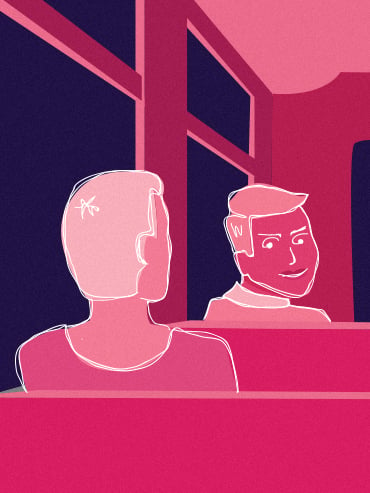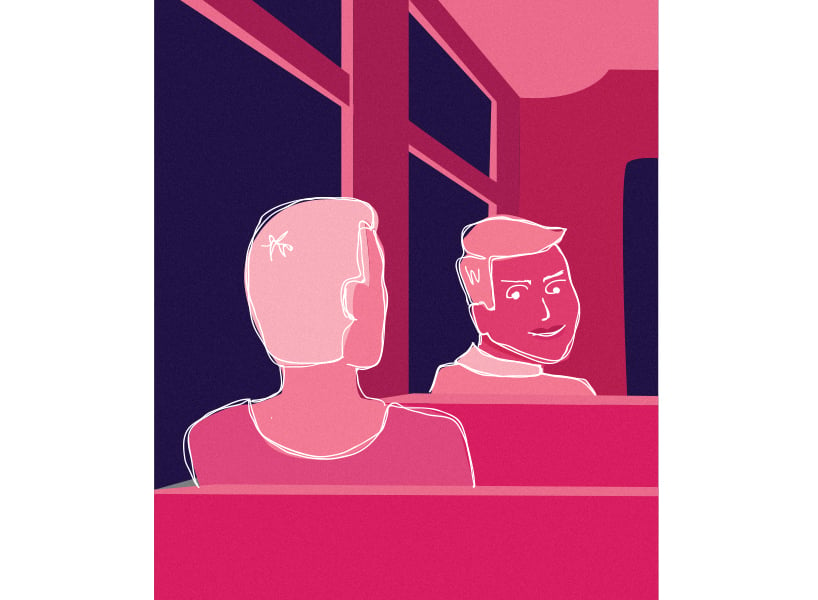The Worst Part About Going to a Sex Club Was What Happened After I Left
At the club, I was free and unburdened. It’s only when I got back to the “real world” that I felt unsafe


It was just after 3 a.m. and I was on my way out of the downtown Toronto sex club where I’d spent a very enjoyable evening. The front desk staff smiled and wished me goodnight as I walked by and I returned the sentiment, a goofy smile plastered on my face. It was the kind of smile you have when you’re leaving the salon after getting an incredible haircut, glowing and triumphant—and I had the night’s experience to thank for that feeling of accomplishment. I had just had sex with two different cis men who I didn’t know and I didn’t feel ashamed, nor had I been coerced or degraded.
As I opened the front door and the brisk Toronto night air hit me, I breathed that information in again: I had just had sex with two men for the first time. After years of being slut-shamed for expressing my desires and seeing cis men as a potential threat that required constant vigilance, I was unburdened. I got onto a streetcar, looked out the window and felt free.
Then, I saw a cis man who I had noticed in passing at the club that night. He was sitting a few rows ahead of me, and he was turned around, watching me. When he saw me looking, he smiled.
All the freedom I had been feeling disappeared.
The appeal of going to a sex club isn’t just sex
Throughout my late 20s, I had several windows of singledom during which I often went, by myself, to a sex club in downtown Toronto. Part of what drew me to the club was a then-recent realization about my gender. At the time, all my friends and loved ones knew me as a woman, but going to a sex club was a way of dipping my toes into describing myself as non-binary. I didn’t owe these strangers anything, so if someone at the club didn’t respect my gender, I moved on. It was easier to walk away from strangers than it was to risk having to walk away from people who were really part of my life.
But I was also trying to understand what I wanted my sex life to be. Up until that point, I’d only had sex within romantic relationships. I was always aware of, and shaped by, what my partner found desirable in me. My partners’ egos needed me to orgasm every time, so I would crawl into the rolodex of scenarios in my imagination that turn me on, and I would use those fantasies to bring myself to orgasm.
The partner touching my body was never actually the thing that made me come, and while I was sick of that being true, I was also too afraid to talk about the fact that the sex wasn’t working for me in case I was cast as difficult, disappointing or just plain defective. At the club, though, I was free to explore sex on my terms. And while a sex club is not a completely safe environment, it was certainly safer than being alone, in a private home, with people I didn’t know.
For the first time, I felt like I could say exactly what I wanted—and what I didn’t want
Still, I went to the sex club many times before I actually hooked up with someone. Just being in the environment—and watching how other people engaged with sex—helped me develop language to express what I wanted. I thought about my script. I practiced it. If I was going to have sex with a person, I’d tell them:
“My pronouns are them and they. You will use these pronouns. I have body hair. I like it. I don’t want to hear any comments from you about it. You will use a condom or a glove for anything that goes inside me, anywhere, including my mouth. No one but you touches me while we’re having sex, and it is your job to enforce that. I don’t play with consensual non-consent: no always means no, stop always means stop, ease up always means ease up. If I say any of these things, you don’t need to apologize, you just need to immediately react to the information. I like being asked. It turns me on. You need to ask me, with your words, before you do anything to my body. I’m going to need you to hold me afterwards.”
While these parameters might sound like they were about how a stranger could treat me during sex, they were equally about what I needed to love about myself so I could be present in my body.
When I tried out my ground rules, I was pleasantly surprised by the response
That first night I had sex at the club, partner number one was a 40-something set painter named John. John was straight and cis. I tried out my ground rules on him—the first time I’d tried out any list of agreements on anyone. To my surprise, he accepted my ground rules were without interrogation, even when I added one on: “I’m on my period tonight. I will bleed on you. Are you good with that?” I was shocked that my menstruation wasn’t an issue; so many cis men I’d been in relationships with had steered clear of contact with my menstrual blood.
I wasn’t present enough in my body to come with John, but I enjoyed him asking me about every progressive touch, and I enjoyed that I could bleed on him without feeling like I should apologize for it. Afterwards John and I cuddled, and then he went home while I stayed at the club.
I wanted more of having sex as a physical act, without emotional involvement that would prompt me to compromise on what I got out of it. So, when I met another straight cis guy, Cass, I laid out my ground rules again. He was game, and this time I wasn’t surprised that what I wanted mattered—which that meant that, for the first time, I moved my body according to my impulses. I found where and how and at what pace I needed to enjoy his body in order to come. It was the first time in my life that I had sex that wasn’t an act of mental masturbation.
But outside of the sex club, the rules hadn’t changed
At the club, I was in a space where what I did with my body didn’t decrease my dignity. I was allowed to explore and express pleasure without it being linked to, or diminishing, my character.
But on the streetcar, with that man watching me, it became clear that we weren’t in that world anymore. At the sex club, there’s an understanding that no one owes anyone sex, and that the ability to give and revoke consent is not diminished by a person’s previous choices. That’s not the case in the “real world.” Instead, I had to slip back into those internal risk assessments that so many trans women, cis women, trans men and non-binary people unconsciously make. If I got off the streetcar, would this guy watching me get off, too? Would he try to talk to me?
I imagined him following me, sexually assaulting me—and then I imagined myself in a police station afterwards, having to tell a police officer that he could get footage of my attacker from the security camera of the front desk of the sex club I’d been at earlier. I imagined the attitude I’d confront: “You went to a sex club, and whatever you call yourself, you have breasts and a vagina, so you’re a woman. You, a woman, went to a sex club without a man. You’re advertising that you’re available, and that you want all the dick. What did you expect would happen?”
No wonder we think about safety in a way cis men do not
For trans women, cis women, trans men and non-binary people, our credibility is linked to who and how and in what context we have sex—and that shapes our sense of safety in the world. I haven’t been to a sex club in years, but even when I went regularly, my enjoyment was always tempered by the fact that if things went wrong, if I was trespassed upon or violated, there would be a lineup of cis men who could point to my decision to go to a sex club as proof that I deserved it. Anyone who isn’t a cis man has to know that “boys will be boys,” right? So, if I was going to make the decisions I did, anything that might happen to me would really be my fault, for making choices that weren’t informed by fear.
I’m grateful I spent my 20s in downtown Toronto, with access to a sex club where I could learn the lessons I needed to about my needs and gender. And I’m still very aware that I was lucky to move through that period of exploration relatively unscathed. But I’ve never forgotten that I had no cis men in my life who could “legitimize” the fact that I was having sex with strangers by confirming that how I was having sex had no impact my integrity.
And that’s why I waited until the last second before I bolted off that streetcar, making sure that he wouldn’t have a chance to follow me.








